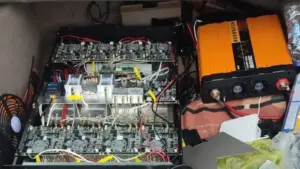Thirty-one months after the fatal night of February 28, 2023, developments in the judicial field are rapid-fire, with prosecutorial authorities finally giving the “green light” for the exhumation of the victims’ bodies from the railway tragedy at Tempi. This decision was made against the backdrop of the hunger strike by Panos Routsi, father of Denis Routsi, one of the 57 victims of the Tempi tragedy. Mr. Routsi had started the hunger strike outside Parliament, demanding comprehensive toxicological and biochemical examinations for his son and the other victims.
After 23 days, he announced the end of his mobilization when he received assurance that prosecutorial authorities would satisfy his request for the exhumation of his son’s body and conduct all necessary laboratory tests to determine the cause of death. The Larissa Prosecutor’s Office decided to allow the exhumations and examinations following relevant requests from relatives. This represents a significant reversal, as these requests had been rejected in the past. The families insisted that the initial forensic reports were not accompanied by complete toxicological or histological examinations, which left room for doubt and prompted their urgent demands for exhumation of the railway tragedy victims.
Tempi: Case file serves as “vehicle” to satisfy exhumation request
To satisfy this request, and while the main case file for the railway tragedy has been sent to court, a case file was retrieved from the archives that had been formed following lawsuits by relatives of railway tragedy victims regarding potential criminal responsibilities of forensic doctors.
This case file, which had been archived, serves as the “vehicle” used by prosecutorial authorities to satisfy the requests of Tempi victims’ relatives. Specifically, the case file concerning potential criminal responsibilities of forensic doctors following lawsuits by railway tragedy victims’ relatives was retrieved from archives based on “new evidence” related to media reports about Panos Routsi’s hunger strike, requesting his son Denis’s exhumation to determine the exact cause of death. The order was given by the Larissa Court of Appeals Prosecutor’s Office to the Chief Prosecutor of the Court of First Instance for conducting a preliminary investigation.
Within this framework, victim exhumations will be carried out to conduct toxicological and biochemical examinations. “We forward the attached publications as new evidence that appears and justifies, in our judgment, their examination, and we request your actions within the framework of urgent preliminary investigation, which we order, to ascertain the commission of punishable acts, prosecuted ex officio (violation of articles 242, 259 of the Penal Code) by the involved forensic doctors-physicians, regarding victims who died at Tempi on 28-2-2023 during the train collision,” the relevant prosecutorial order states. In 2024, this specific case file had been archived, as it was determined, among other things, that “these specific examinations in cases of deaths from mass disasters are conducted at the discretion of forensic doctors, as mentioned in the special human loss management plan, always according to data and indisputable rules of forensic science.
In this case, there was no dispute regarding the cause of death for any body that would require histological examinations, an act that becomes forensically necessary when the cause of death is not apparent and further investigation through laboratory examinations of tissue samples is required for microscopic detection of pathognomonic findings not visible macroscopically,” adding that “autopsy and necrotomy findings left no room for disputing the cause of death in passengers who were carbonized, and there was no further field for scientific search for another cause of death.” Now, following this decision, relatives who have requested exhumation of their loved ones (Maria Karystianos, Pavlos Aslanidis, Christos Konstantinidis) are appointing their own technical advisors to proceed with the exhumation process.
At the Supreme Court
Meanwhile, time is counting down for the start of the high-profile trial, with 36 defendants in the dock, 33 for felony charges and three for misdemeanors. During the hearing process, victims’ relatives will have the opportunity to make any other requests they wish that may not have been satisfied during the investigation stage. Simultaneously, cases involving political figures are “running” at the Supreme Court, including former Transport Minister Kostas Ach. Karamanlis and then Deputy Minister to the Prime Minister, Christos Triantopoulos. In the investigation for the Triantopoulos case, concerning allegations of tampering with the railway accident site, relatives of railway tragedy victims are testifying. Among them is Pavlos Aslanidis, who, testifying during the week, requested upgrading the indictment from the misdemeanor of breach of duty to a felony.
Published in Parapolitika




